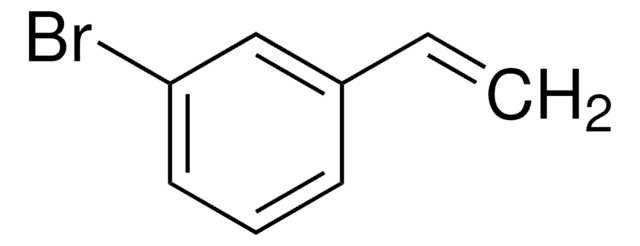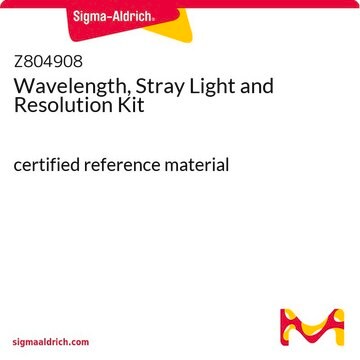All Photos(1)
About This Item
Empirical Formula (Hill Notation):
C6H3Br3
CAS Number:
Molecular Weight:
314.80
EC Number:
MDL number:
UNSPSC Code:
12352100
PubChem Substance ID:
NACRES:
NA.22
Recommended Products
Assay
95%
form
solid
mp
41-43 °C (lit.)
SMILES string
Brc1ccc(Br)c(Br)c1
InChI
1S/C6H3Br3/c7-4-1-2-5(8)6(9)3-4/h1-3H
InChI key
FWAJPSIPOULHHH-UHFFFAOYSA-N
Related Categories
General description
1,2,4-tribromobenzene on photochemical dehalogenation in open-air solutions of acetonitrile yields 1,4-dibromobenzene, 1,3-dibromobenzene and 1,2-dibromobenzene.
Application
1,2,4-tribromobenzene was used in the synthesis of hyperbranched poly(p-phenylene ethynylenes). It was used as cross-linking reagent during Pd-catalyzed cross-coupling of 2,5-diiodo-4-[(2-ethylhexyl)oxy]methoxybenzene and 1,4-diethynyl-2,5-bis-(octyloxy)benzene.
Signal Word
Warning
Hazard Statements
Precautionary Statements
Hazard Classifications
Aquatic Acute 1 - Aquatic Chronic 1 - Eye Irrit. 2 - Skin Irrit. 2 - STOT SE 3
Target Organs
Respiratory system
Storage Class Code
11 - Combustible Solids
WGK
WGK 3
Flash Point(F)
235.4 °F - closed cup
Flash Point(C)
113 °C - closed cup
Personal Protective Equipment
dust mask type N95 (US), Eyeshields, Gloves
Certificates of Analysis (COA)
Search for Certificates of Analysis (COA) by entering the products Lot/Batch Number. Lot and Batch Numbers can be found on a product’s label following the words ‘Lot’ or ‘Batch’.
Already Own This Product?
Find documentation for the products that you have recently purchased in the Document Library.
Hyperbranched Poly (p-phenylene ethynylene) s.
Mendez JD, et al.
Macromolecular Chemistry and Physics, 208(15), 1625-1636 (2007)
E N Smith et al.
Journal of toxicology and environmental health, 6(4), 737-749 (1980-07-01)
1,2,4-Trichlorobenzene (TCB) and 1,2,4-tribromobenzene (TBB) were administered for 7 d to rats at a dose of 1 mmol/kg.d. The animals were sacrificed at various times to observe the decline in enzyme induction. Carbon 14-labeled TCB and TBB were administered and
Synthesis and characterization of cross-linked conjugated polymer milli-, micro-, and nanoparticles.
Eric Hittinger et al.
Angewandte Chemie (International ed. in English), 43(14), 1808-1811 (2004-04-01)
P K Freeman et al.
Journal of chemical technology and biotechnology (Oxford, Oxfordshire : 1986), 72(1), 45-49 (1998-06-17)
The photochemical dehalogenation of 1,2,4-tribromobenzene, 1,2,3,5-tetrabromobenzene and pentachlorobenzene in open-air solutions of acetonitrile using natural and artificial sunlight as the irradiation source has been investigated. The regiochemistry of mono-dehalogenation has been determined for 1,2,4-tribromobenzene and 1,2,3,5-tetrabromobenzene. Pentachlorobenzene did not react.
Darol E Dodd et al.
International journal of toxicology, 31(3), 250-256 (2012-04-06)
Male Sprague-Dawley rats were exposed to 1,2,4-tribromobenzene (TBB) by gavage for 5 days, 2, 4, and 13 weeks at 0, 2.5, 5, 10, 25, or 75 mg/kg per d. There were no TBB exposure-related clinical signs of toxicity or changes
Our team of scientists has experience in all areas of research including Life Science, Material Science, Chemical Synthesis, Chromatography, Analytical and many others.
Contact Technical Service










